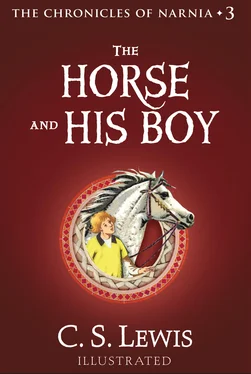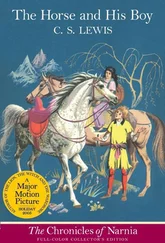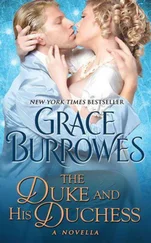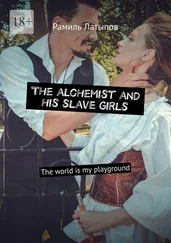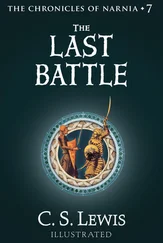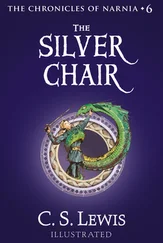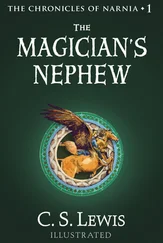The stranger demanded hospitality for the night which of course the fisherman dared not refuse. All the best they had was set before the Tarkaan for supper (and he didn’t think much of it) and Shasta, as always happened when the fisherman had company, was given a hunk of bread and turned out of the cottage. On these occasions he usually slept with the donkey in its little thatched stable. But it was much too early to go to sleep yet, and Shasta, who had never learned that it is wrong to listen behind doors, sat down with his ear to a crack in the wooden wall of the cottage to hear what the grown-ups were talking about. And this is what he heard:
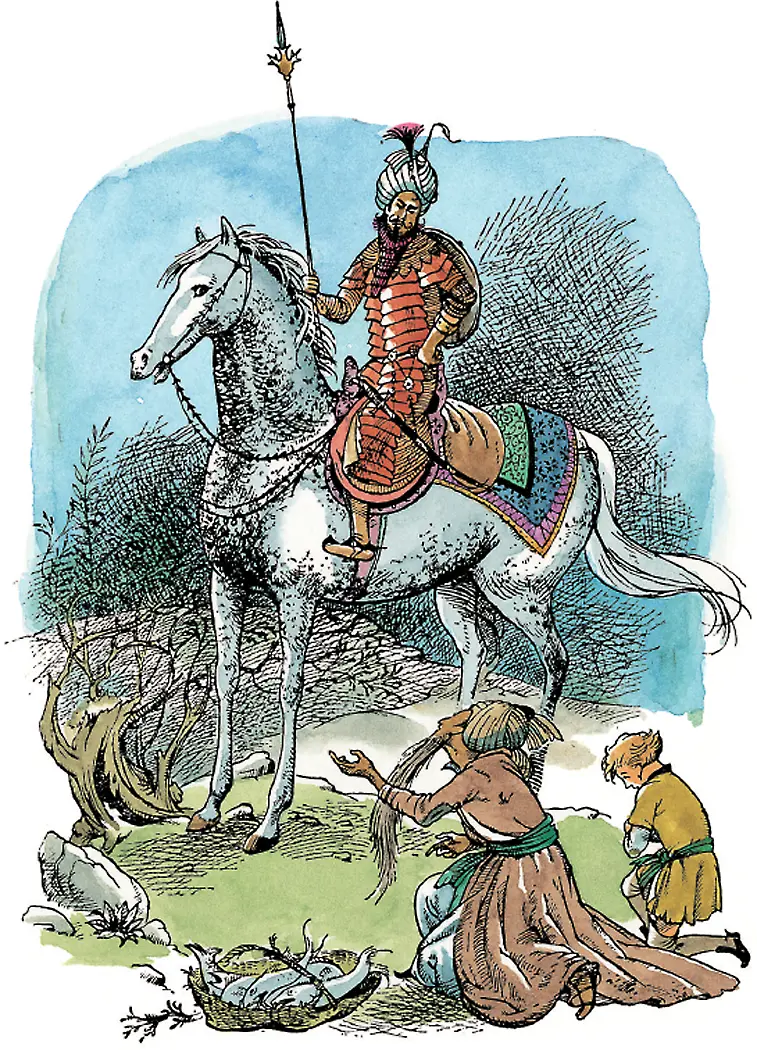
“And now, O my host,” said the Tarkaan, “I have a mind to buy that boy of yours.”
“O my master,” replied the fisherman (and Shasta knew by the wheedling tone the greedy look that was probably coming into his face as he said it), “what price could induce your servant, poor though he is, to sell into slavery his only child and his own flesh? Has not one of the poets said, ‘Natural affection is stronger than soup and offspring more precious than carbuncles’?”
“It is even so,” replied the guest dryly. “But another poet has likewise said, ‘He who attempts to deceive the judicious is already baring his own back for the scourge’. Do not load your aged mouth with falsehoods. This boy is manifestly no son of yours, for your cheek is as black as mine but the boy is fair and white like the accursed but beautiful barbarians who inhabit the remote North.”
“How well it was said,” answered the fisherman, “that Swords can be kept off with shields but the Eye of Wisdom pierces through every defence! Know then, O my formidable guest, that because of my extreme poverty I have never married and have no child. But in that same year in which the Tisroc (may he live for ever) began his august and beneficent reign, on a night when the moon was at her full, it pleased the gods to deprive me of my sleep. Therefore I arose from my bed in this hovel and went forth to the beach to refresh myself with looking upon the water and the moon and breathing the cool air. And presently I heard a noise as of oars coming to me across the water and then, as it were, a weak cry. And shortly after, the tide brought to the land a little boat in which there was nothing but a man lean with extreme hunger and thirst who seemed to have died but a few moments before (for he was still warm), and an empty water-skin, and a child, still living. ‘Doubtless,’ said I, ‘these unfortunates have escaped from the wreck of a great ship, but by the admirable designs of the gods, the elder has starved himself to keep the child alive and has perished in sight of land.’ Accordingly, remembering how the gods never fail to reward those who befriend the destitute, and being moved by compassion (for your servant is a man of tender heart)—”
“Leave out all these idle words in your own praise,” interrupted the Tarkaan. “It is enough to know that you took the child – and have had ten times the worth of his daily bread out of him in labour, as anyone can see. And now tell me at once what price you put on him, for I am wearied with your loquacity.”
“You yourself have wisely said,” answered Arsheesh, “that the boy’s labour has been to me of inestimable value. This must be taken into account in fixing the price. For if I sell the boy I must undoubtedly either buy or hire another to do his work.”
“I’ll give you fifteen crescents for him,” said the Tarkaan.
“Fifteen!” cried Arsheesh in a voice that was something between a whine and a scream. “Fifteen! For the prop of my old age and the delight of my eyes! Do not mock my grey beard, Tarkaan though you be. My price is seventy.”
At this point Shasta got up and tiptoed away. He had heard all he wanted, for he had often listened when men were bargaining in the village and knew how it was done. He was quite certain that Arsheesh would sell him in the end for something much more than fifteen crescents and much less than seventy, but that he and the Tarkaan would take hours in getting to an agreement.
You must not imagine that Shasta felt at all as you and I would feel if we had just overheard our parents talking about selling us for slaves. For one thing, his life was already little better than slavery; for all he knew, the lordly stranger on the great horse might be kinder to him than Arsheesh. For another, the story about his own discovery in the boat had filled him with excitement and with a sense of relief. He had often been uneasy because, try as he might, he had never been able to love the fisherman, and he knew that a boy ought to love his father. And now, apparently, he was no relation to Arsheesh at all. That took a great weight off his mind. “Why, I might be anyone!” he thought. “I might be the son of a Tarkaan myself – or the son of the Tisroc (may he live for ever) – or of a god!”
He was standing out in the grassy place before the cottage while he thought these things. Twilight was coming on apace and a star or two was already out, but the remains of the sunset could still be seen in the west. Not far away the stranger’s horse, loosely tied to an iron ring in the wall of the donkey’s stable, was grazing. Shasta strolled over to it and patted its neck. It went on tearing up the grass and took no notice of him.
Then another thought came into Shasta’s mind. “I wonder what sort of a man that Tarkaan is,” he said out loud. “It would be splendid if he was kind. Some of the slaves in a great lord’s house have next to nothing to do. They wear lovely clothes and eat meat every day. Perhaps he’d take me to the wars and I’d save his life in a battle and then he’d set me free and adopt me as his son and give me a palace and a chariot and a suit of armour. But then he might be a horrid cruel man. He might send me to work on the fields in chains. I wish I knew. How can I know? I bet this horse knows, if only he could tell me.”
The Horse had lifted its head. Shasta stroked its smooth-as-satin nose and said, “I wish you could talk, old fellow.”
And then for a second he thought he was dreaming, for quite distinctly, though in a low voice, the Horse said, “But I can.”
Shasta stared into its great eyes and his own grew almost as big, with astonishment.
“How ever did you learn to talk?”
“Hush! Not so loud,” replied the Horse. “Where I come from, nearly all the animals talk.”
“Wherever is that?” asked Shasta.
“Narnia,” answered the Horse. “The happy land of Narnia – Narnia of the heathery mountains and the thymy downs, Narnia of the many rivers, the plashing glens, the mossy caverns and the deep forests ringing with the hammers of the Dwarfs. Oh, the sweet air of Narnia! An hour’s life there is better than a thousand years in Calormen.” It ended with a whinny that sounded very like a sigh.
“How did you get here?” said Shasta.
“Kidnapped,” said the Horse. “Or stolen, or captured – whichever you like to call it. I was only a foal at the time. My mother warned me not to range the southern slopes, into Archenland and beyond, but I wouldn’t heed her. And by the Lion’s Mane I have paid for my folly. All these years I have been a slave to humans, hiding my true nature and pretending to be dumb and witless like their horses.”
“Why didn’t you tell them who you were?”
“Not such a fool, that’s why. If they’d once found out I could talk they would have made a show of me at fairs and guarded me more carefully than ever. My last chance of escape would have been gone.”
Читать дальше
